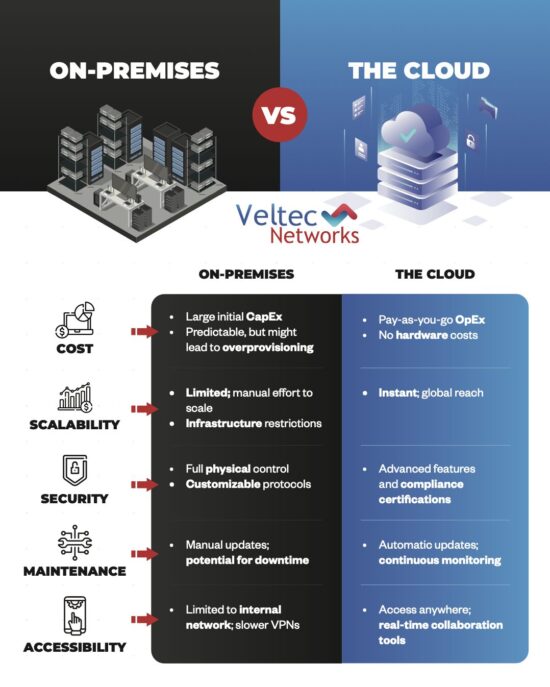The Top 10 Reasons Cloud Servers Are A Significantly Better Business Decision Over Traditional On-Premise Servers: An In-Depth Analysis
In today’s fast-paced business environment, you need technology that keeps up. This is where cloud servers come in. They have quickly become the go-to solution for many businesses looking to upgrade from traditional on-premise servers. Cloud servers are a significantly better business decision than traditional on-premise servers due to their flexibility, cost-effectiveness, and ease of maintenance.
With cloud servers, you can quickly scale your infrastructure based on your business needs. This means you only pay for what you use, helping you save money in the long run. The service provider manages maintenance and upgrades, taking a significant burden off your IT team and ensuring you always have the latest technology.
Cloud servers also offer superior performance, quick access to data, and robust security features that protect your business data. They support business continuity and disaster recovery so your business can run smoothly during unexpected events. Choosing cloud servers is not just a tech upgrade; it’s a strategic move for future-proofing your business.
Download Veltec’s Free Information Sheet On This Topic
Key Takeaways
- Cloud servers offer flexibility and cost savings.
- The provider manages maintenance and upgrades.
- Cloud servers ensure strong performance and security.
Cost-Effectiveness of Cloud Servers
Cloud servers can save businesses money in several important ways. They help to reduce upfront costs, provide predictable monthly expenses, and take advantage of economies of scale.
Reduction in Capital Expenditure
You don’t need to buy expensive hardware when you use cloud servers. Traditional on-premise servers require you to spend much money upfront on servers, networking equipment, and software licenses.
With cloud servers, these costs are spread out over time. This means more cash flow that can be used for other parts of your business. You also save on maintenance costs because the cloud provider handles hardware repairs and updates.
Cloud servers allow you to avoid the costs of physical space, cooling, and electricity. All these savings add up, making cloud servers an intelligent financial choice.
Predictable Operating Expenses
Cloud servers operate on a metered, pay-per-use model. This means you only pay for what you use each month. This model can make budgeting much easier for your business.
Traditional servers often have hidden costs, such as unexpected maintenance or the need for additional hardware. However, cloud servers are more predictable and transparent.
Many cloud providers offer flexible pricing plans. You can choose a plan that fits your needs and scale up or down as necessary without surprises.
Economies of Scale Benefits
Cloud providers serve many customers, giving them the power to buy hardware in bulk. This reduces costs, and the savings are often passed on to you.
Using cloud servers gives you access to cutting-edge technology without the high price tag. Cloud providers regularly update their hardware and software to ensure high performance and security.
These providers also offer robust customer support. Their expertise and resources can save your business from costly downtime and technical issues.
Cloud servers use economies of scale to offer advanced features and services at a fraction of the cost. This makes them a compelling choice for businesses looking to maximize their IT investments.
Scalability and Flexibility
Cloud servers provide numerous advantages over traditional on-premise servers. They allow businesses to adjust resources dynamically and scale rapidly, ensuring your operations remain efficient and cost-effective.
Dynamic Resource Allocation
With cloud servers, you can adjust resources based on demand. You can allocate more processing power, storage, or memory during peak times to handle increased workloads. Conversely, resources can be scaled down during off-peak times, reducing costs and increasing efficiency.
This process is automated, so you don’t need to intervene manually. This flexibility is beneficial for businesses with seasonal spikes or fluctuating workloads. You avoid over-provisioning and unnecessary expenditures by matching resource allocation to actual needs.
Furthermore, cloud providers offer monitoring tools that give you insights into resource usage. This data helps make informed decisions about scaling and optimizing performance. Essentially, dynamic resource allocation ensures your infrastructure adapts seamlessly to changing conditions.
Rapid Elasticity and Scaling
Cloud servers excel at quickly scaling resources up or down, a feature known as rapid elasticity. This allows you to respond immediately to changing demands without significant delays or disruptions. For example, if your website experiences an unexpected traffic surge, additional resources can be deployed instantly to maintain performance.
This swift scaling capability is crucial for maintaining user satisfaction and avoiding potential downtime. Traditional on-premise servers lack this flexibility, often requiring significant time and capital to upgrade or expand.
Additionally, cloud environments support horizontal and vertical scaling. Horizontal scaling adds more servers to distribute the load, while vertical scaling increases the capacity of existing servers. Both methods ensure your infrastructure remains robust and responsive to growth, making rapid elasticity a key advantage of cloud solutions.
Maintenance and Upgrades
Switching to cloud servers reduces the burden of maintaining hardware and ensures software updates occur seamlessly without demanding constant manual intervention.
Reduced Maintenance Burden
Cloud servers eliminate the need for extensive hardware upkeep. You no longer have to worry about physical server rooms, cooling systems, or backup generators. This shift lets you focus more on your core business activities than hardware management’s nitty-gritty.
Additionally, cloud service providers handle the hardware upgrades, security patches, and infrastructure maintenance. This means fewer interruptions to your operations and less time spent on troubleshooting hardware failures. Your team can operate more efficiently and dedicate resources to critical projects.
Another significant advantage is scalability. Cloud providers offer flexible resources that grow with your business. You avoid up-front costs for hardware that may remain underused, thus ensuring an optimal balance between performance and price.
Automatic Software Updates
Cloud servers provide automatic updates, so you always use the latest software. This feature is crucial as it incorporates security patches and new features without manual input. Your IT team doesn’t need to schedule downtimes to update systems, reducing the risk of vulnerabilities.
Cloud providers handle all software maintenance aspects, allowing for seamless integration. You benefit from continuous performance improvements and enhanced security measures that come with these updates.
These automatic updates ensure compliance with industry standards and regulations. By staying current with the latest versions, you align with best practices without added workload. This streamlining is essential for maintaining productivity and security in your business operations.
Performance and Speed
Cloud servers offer significant advantages in availability, reliability, and overall performance, making them a superior choice over traditional on-premise servers.
High Availability and Reliability
One key benefit of cloud servers is high availability. Cloud services often use redundant systems to ensure your applications and data remain accessible even if one server fails. This means less downtime and more consistent performance.
Moreover, cloud providers typically have data centers across various geographic locations. This geographic distribution helps quickly route your data and applications through the most efficient paths, reducing latency and enhancing speed. Additionally, it increases resilience against local failures due to power outages or natural disasters.
Cloud platforms also offer automated backups and failover protocols. These can be configured to activate automatically when issues arise, ensuring seamless transitions and minimizing disruptions. This added reliability is critical for businesses where uptime is essential.
Improved Server Performance
Cloud servers’ s scalability is a significant performance advantage. You can easily adjust computing resources based on demand, scaling up during high-traffic periods and down during slower times. This flexibility ensures optimal performance without overcommitting to hardware.
Furthermore, cloud services often provide access to the latest hardware without requiring you to invest in physical upgrades. This means you benefit from high-performance CPUs, SSDs, and other cutting-edge technologies, which can significantly boost your server speeds.
Another performance factor is load balancing. Cloud providers frequently offer advanced load-balancing features that distribute workloads efficiently across multiple servers. This helps maintain optimal performance even during peak usage times.
Finally, cloud servers can offer enhanced network performance due to high-bandwidth solutions and optimized routing. Enhanced networking capabilities ensure faster data transfer rates and reduced latency, contributing to a more responsive and efficient system.
Business Continuity and Disaster Recovery
Cloud servers strongly support business continuity and disaster recovery by ensuring data is always backed up securely and offering quick recovery options in case of disruptions.
Robust Data Backup Solutions
Cloud servers offer a range of robust data backup solutions that ensure your data is continuously protected. Automatic backups can be scheduled regularly without manual intervention, reducing the risk of human error. This continuous backup process ensures that even the most recent data remains safe.
Cloud providers often offer redundant storage options, so your data is replicated across multiple locations. This geographic spread reduces the risk of data loss due to localized issues, such as natural disasters. Business operations can continue smoothly without worrying about losing critical data.
Implementing these backup solutions requires minimal setup, making it an efficient and cost-effective way to secure business-critical information.
Enhanced Disaster Recovery Capabilities
Cloud servers’ disaster recovery capabilities are powerful and can significantly reduce downtime. Cloud providers typically offer rapid recovery options to restore your systems and data in hours, if not minutes. This quick turnaround time is vital for maintaining business operations during unexpected events.
Furthermore, many cloud services provide access to cutting-edge disaster recovery tools and resources. These tools can automate recovery, ensuring a swift return to normal business functions. According to an ISC2 Article, disaster recovery is a critical subset of business continuity.
The flexibility of cloud-based disaster recovery allows you to choose tailored solutions that meet your specific needs, whether mirroring databases or ensuring critical applications are always available. This adaptability makes cloud servers an essential tool for effective disaster management.
Access and Collaboration
Cloud servers offer significant advantages for businesses in terms of accessibility and collaboration. They enable global access to data and streamline team collaboration.
Global Accessibility
With cloud servers, you can access your data from anywhere in the world. This global accessibility allows employees to work remotely, staying productive even when not in the office. Imagine your team members needing to access critical files during a business trip; cloud storage makes this seamless.
Data stored in the cloud is not tied to a specific device. You can log in from any device with an internet connection, whether a laptop, tablet, or smartphone. Your data is available anytime and anywhere. This flexibility can be crucial for teams spread across different locations.
Moreover, cloud servers ensure that data is always up-to-date. When changes are made, they are immediately available to everyone with access. This reduces the risk of working with outdated information, which can be problematic with on-premises servers.
Facilitated Team Collaboration
Cloud servers significantly improve team collaboration. Files stored in the cloud can be shared easily with team members, allowing real-time collaboration. This means multiple people can work on the same document simultaneously, making edits and updates that everyone can see instantly.
Cloud-based tools often come with built-in functionalities that enhance teamwork. Features like shared calendars, project management software integration, and instant messaging can streamline team operations, improving communication and project coordination.
Using cloud servers also simplifies the process of granting and revoking access to data. Permissions can be managed centrally, ensuring the right people can access the correct information when needed. This level of control is much harder to achieve with traditional on-premises solutions.
Security and Compliance
Cloud servers provide enhanced security features and meet strict regulatory standards, making them a reliable business choice.
Advanced Security Features
Cloud service providers (CSPs) use advanced security measures to protect your data. They offer encryption to keep data safe during transmission and storage. These providers implement multi-factor authentication, ensuring only authorized users can access sensitive information.
Additionally, CSPs have dedicated security teams that constantly monitor for threats. This proactive approach helps detect and mitigate potential risks quickly. With the ability to dynamically allocate resources, these providers can apply extensive filtering and authentication processes across their services, making it difficult for unauthorized access.
Regulatory Compliance and Standards
Many businesses need to comply with various regulatory standards to protect customer data. Cloud service providers adhere to numerous compliance frameworks such as GDPR, HIPAA, and PCI DSS. These providers are audited regularly to ensure they meet the required standards.
Using cloud servers helps your business stay compliant without investing heavily in specific infrastructure. Knowing your data storage and handling meet strict regulations gives you peace of mind. This is especially critical for industries like healthcare and finance, where data protection is paramount. Furthermore, providers like Gartner offer solutions that ensure resilience and security, giving you a competitive edge in maintaining compliance.
Environmental Impact
Cloud servers typically offer notable environmental sustainability benefits over traditional on-premise servers. They help reduce the carbon footprint and increase energy efficiency.
Reduced Carbon Footprint
Switching to cloud servers drastically reduces businesses’ carbon footprint. Traditional on-premise servers consume much energy and require constant cooling, leading to high carbon emissions. On the other hand, cloud providers often use clean energy sources and more efficient server utilization.
For example, the average corporate data center operates on a mix of energy sources that often include fossil fuels. In contrast, major cloud providers like AWS have optimized their infrastructure to run on renewable energy, reducing their carbon emissions by up to 28%. This move helps businesses significantly reduce their environmental impact.
Moreover, cloud computing reduces the need for physical hardware, lowering the waste generated from outdated or broken devices. Your business can adopt a greener approach by eliminating the constant churn of physical servers and networking equipment.
Energy Efficient Infrastructure
Cloud data centers are designed for energy efficiency. They use advanced cooling systems and energy management techniques to minimize power consumption. Traditional servers housed in office buildings often lack such optimized infrastructure.
Cloud facilities benefit from economies of scale. A single large data center can serve thousands of businesses, balancing load and ensuring servers are used efficiently. This shared model leads to better energy utilization than individual companies running their servers.
Additionally, technologies like AI and ML monitor and manage energy use in cloud data centers. This automation leads to more precise adjustments, further reducing unnecessary energy use. Moving to the cloud allows you to tap into a highly optimized and energy-efficient infrastructure.
Future-Proofing the Business
By leveraging cloud servers, businesses can stay ahead of rapid technological changes and maintain an edge over competitors. This section will delve into how cloud computing adapts to new technologies and provides a competitive advantage.
Adapting to Technological Advancements
Cloud servers enable businesses to adapt to new technologies quickly. As the IT landscape evolves, cloud providers regularly update their infrastructure. This ensures you can access the latest hardware and software without costly upgrades or replacements.
Switching to cloud servers means you can effortlessly integrate advancements like machine learning or artificial intelligence into your operations. Your team can focus on innovation instead of managing obsolete systems. This adaptability can streamline workflows, enhance productivity, and foster a culture of continuous improvement.
Additionally, automatic updates and patches from cloud providers reduce the risks associated with outdated software. Cybersecurity is enhanced as threat landscapes evolve. This adaptability ensures your business remains secure and compliant with industry standards, giving you peace of mind as you grow.
Competitive Advantage
Migrating to cloud servers grants your business a competitive advantage by offering scalable resources and flexible solutions. As your business grows, cloud servers can quickly scale to meet increased demand, eliminating the need for significant upfront investments in physical infrastructure.
Cloud services also support collaboration through real-time data sharing and communication tools. Teams can work seamlessly from different locations, improving efficiency and innovation. Businesses using cloud computing can respond faster to market changes, launch new products quickly, and provide better customer experiences.
Leveraging data analytics provided by cloud platforms allows for deeper insights into customer behavior and market trends. This data-driven approach enables more informed decision-making and better strategic planning. With cloud computing, you can position your business at the forefront of technological advancements and market opportunities.
Why Veltec Networks Is The Only Choice To Help With The Deployment Of Cloud Based Servers
Veltec Networks offers expertise in cloud solutions, ensuring your business can leverage cloud computing’s flexibility and scalability. Their team is skilled in creating custom solutions that match your specific needs.
Veltec Networks provides secure cloud services. They ensure that your data is accessible anytime, anywhere, with solid security measures. Regular updates and maintenance mean your systems are continuously updated with the latest security patches and software enhancements.
Their approach to cost management can help you save money. With cloud infrastructure, you can avoid the high upfront costs of purchasing hardware and software licenses.
You benefit from their comprehensive strategy development. Veltec Networks aids businesses in crafting effective cloud strategies, ensuring smoother transitions and enhanced productivity.
Consistent support and monitoring make Veltec Networks reliable. They offer continuous monitoring and proactive support, reducing downtime and helping to address issues promptly.
They also ensure seamless integration with your existing systems. Veltec Networks’ solutions are designed to work with various platforms, making the transition to the cloud more straightforward and less disruptive.
Choosing Veltec Networks means choosing a partner committed to your long-term success. They will work closely with you to understand your goals and provide tailored solutions that grow your business.
For cloud deployment services, turn to Veltec Networks for expertise, security, and dedicated support.






